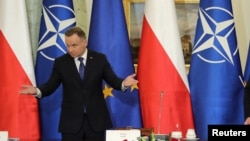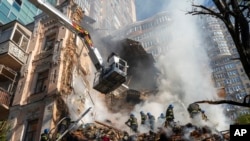On the afternoon of November 15, Polish authorities said a projectile exploded near the village of Przewodow near the Ukraine border, killing two people.
Ukraine officials and some news reports initially attributed the strike to Russia, which that afternoon had launched scores of missiles at electric power facilities and other targets across Ukraine. President Volodymyr Zelenskyy called the apparent strike on Poland a “significant escalation” in the war.
The Russian Ministry of Defense issued a blunt denial.
“Polish mass media and officials commit deliberate provocation to escalate situation with their statement on alleged impact of 'Russian' rockets at Przewodow,” the ministry said on Telegram.
That is misleading.
True enough, the next day authorities in Poland said the explosion appeared to be from a Ukrainian air defense missile and not an intentional attack by Russia. The prospect of the latter sparked fears that the United States and its NATO allies, which include Poland, could be pulled into direct conflict with Russia.
But Jens Stoltenberg, the NATO secretary general, got it right when he stated that the provocation was Russia's, not Poland's or Ukraine's:
“Let me be clear: This is not Ukraine’s fault. Russia bears ultimate responsibility as it continues its illegal war against Ukraine.”
In the latest attack, Zelenskyy said Russia had fired some 85 missiles at power facilities across Ukraine, causing multiple blackouts. Ukraine defenders claimed to have shot down about 70.
It’s not the first time Russia has aimed at civilian targets. After a similar barrage in mid-October, using cruise missiles and Iranian suicide drones, European Commission President Ursula von der Leyen said Russia had committed war crimes.
“Targeted attacks on civilian infrastructure with the clear aim to cut off men, women, children of water, electricity and heating with the winter coming – these are acts of pure terror, and we have to call it as such,” she said.
Article 8 of the Rome Statute of the International Criminal Court defines war crimes to include the following:
"Extensive destruction and appropriation of property, not justified by military necessity and carried out unlawfully and wantonly;"
And:
"Intentionally directing attacks against the civilian population as such or against individual civilians not taking direct part in hostilities;
"Intentionally directing attacks against civilian objects, that is, objects which are not military objectives;"
And:
"Intentionally launching an attack in the knowledge that such attack will cause incidental loss of life or injury to civilians or damage to civilian objects or widespread, long-term and severe damage to the natural environment which would be clearly excessive in relation to the concrete and direct overall military advantage anticipated;
"Attacking or bombarding, by whatever means, towns, villages, dwellings or buildings which are undefended and which are not military objectives."
Neither Russia nor Ukraine is among the 123 states that are parties to the Rome Statute treaty, although Ukraine has agreed to some limited jurisdiction for war crimes on its territory.
The International Criminal Court at The Hague prosecutes war crimes under the Rome Statute and is investigating allegations against Russia and Ukraine. The ICC, however, relies on the cooperation of states to detain those accused of responsibility, something that's far from a sure bet in Russia.
In September, an independent United Nations investigative commission concluded that war crimes have been committed — with the overwhelming majority by Russian forces. A U.N. summary of the commission’s findings, based on visits to 27 towns and settlements, cited:
“… documented unlawful killings — including summary executions of civilians — in more than 30 settlements in Kyiv, Chernihiv, Kharkiv and Sumy regions, by Russian armed forces while they controlled these areas in late February and March.
“... [a] surprisingly ‘large number of executions’ in 16 towns and settlements, where ‘common elements’ of the crimes included ‘visible signs of executions on bodies, such as hands tied behind backs, gunshot wounds to the head, and slit throats.’
“… [E]xplosive weapons had been used by the Russian Federation forces, ‘without distinguishing between civilians and combatants in populated areas’.”
Commissioner Pablo de Greiff said:
“We have found two instances of ill-treatment of Russian Federation soldiers by Ukrainian soldiers, and we mentioned this in our statement. We have found obviously significantly larger numbers of instances that amount to war crimes on the part of the Russian Federation.”
In October, a joint investigation by the news organizations Bellingcat, The Insider and Der Spiegel identified 33 Russia service members in a special army unit responsible for targeting missile strikes against Ukraine.
Reporting on the findings, the independent Kyiv Post said:
“Practically all are highly educated military engineers and active-duty officers, with backgrounds in information technology, software construction, or in a few cases computer game development, the report said.
“European rights protection groups said the report constituted hard evidence that should lead to war crimes prosecutions against specific individuals.
“’The people who are responsible for programming the missiles (to target) playgrounds, apartment buildings and power stations have names and faces,’ the International Society of Human Rights said in an Oct. 24 statement.”
In September, Russian Foreign Minister Sergei Lavrov said his country's law enforcement had sent the names of more than 200 people accused of shelling civilians to the International Criminal Court, along with 3,000 reports of alleged war crimes in Ukraine’s Donbas region.
At a meeting of the U.N. Security Council Lavrov claimed:
"Criminal cases against citizens of the United Kingdom, Canada, the United States and the Netherlands, suspected of mercenarism and war crimes, are now being investigated. I assure you that all those guilty will be held accountable regardless of their citizenship."
But as Reuters reported, British Foreign Secretary James Cleverly urged the council to counter the “catalogue of lies” from the Kremlin.
"We must make clear to [Russian] President [Vladimir] Putin that his attack on the Ukrainian people must stop, that there can be no impunity for those perpetrating atrocities," Cleverly said.






